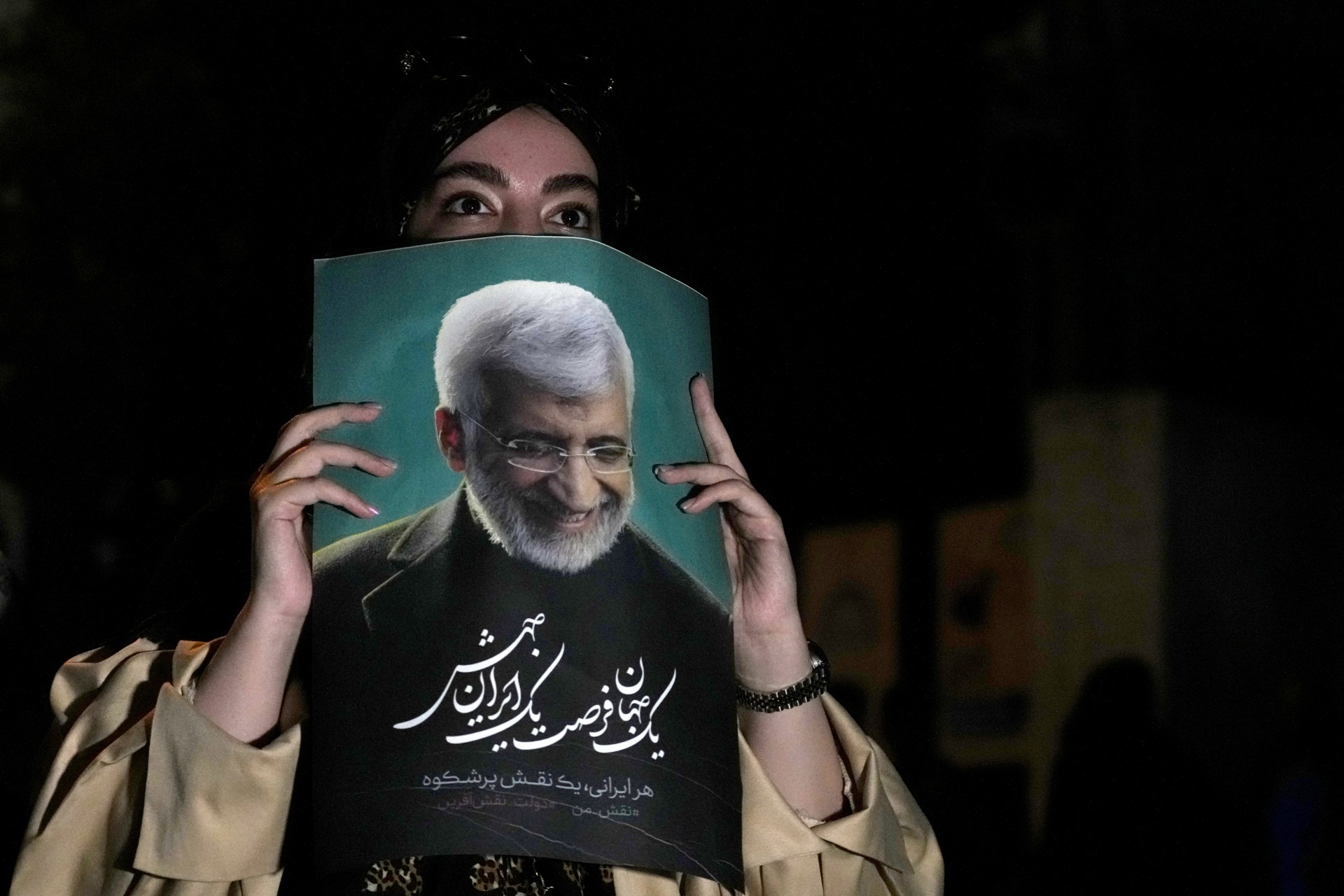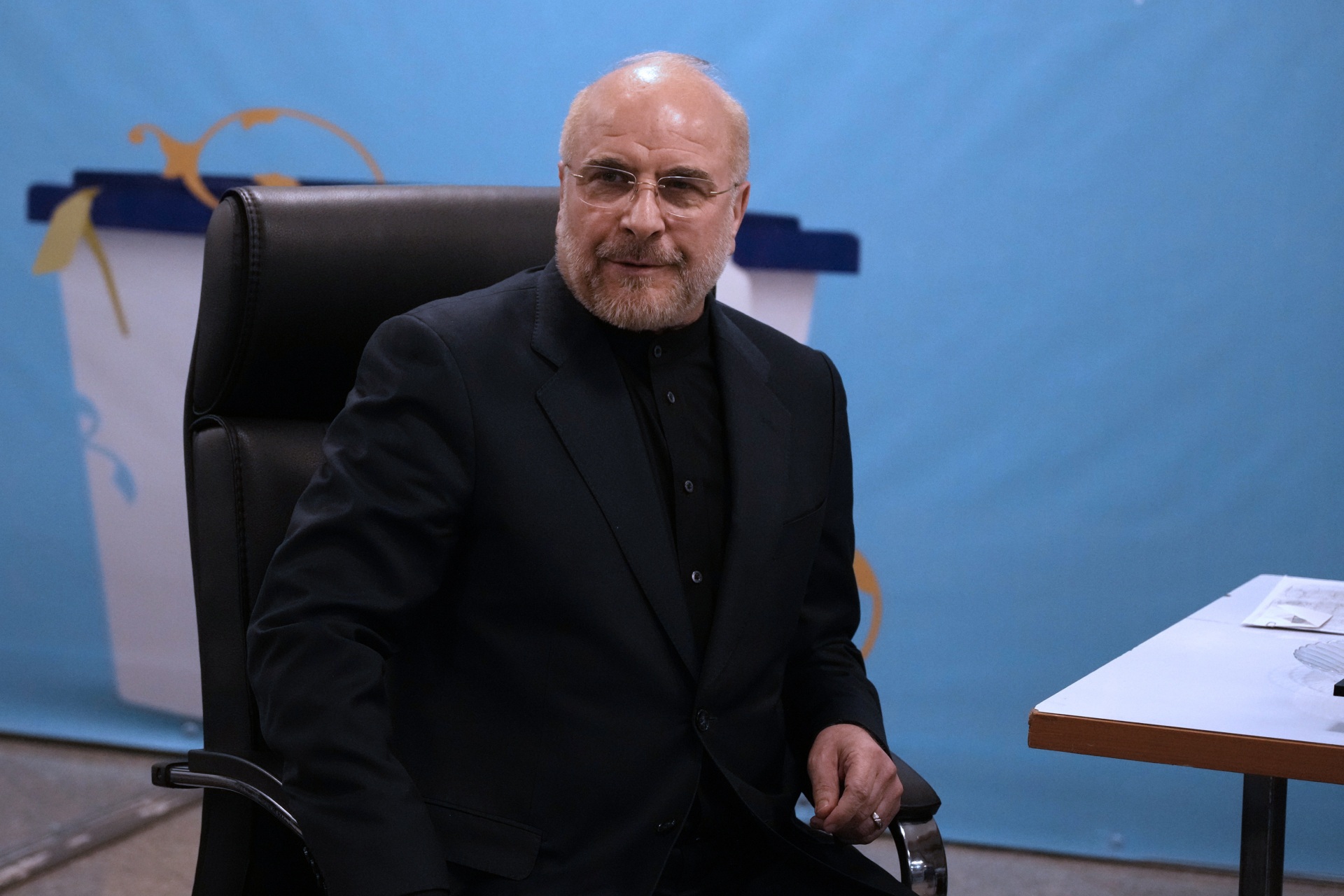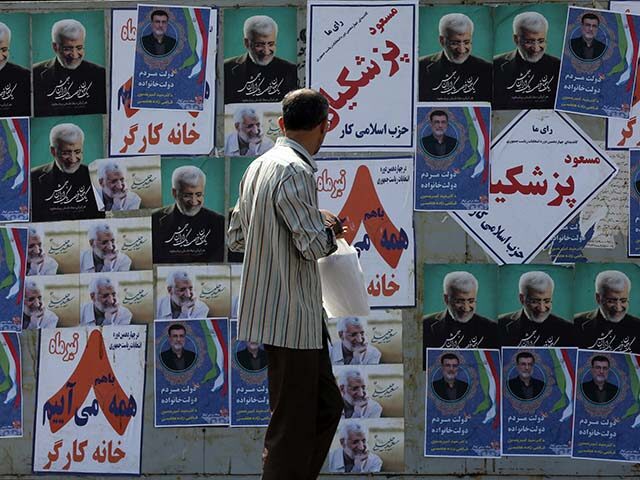Two of the “hardliner” candidates in Iran’s sham presidential “election” dropped out on Thursday, urging their followers to unite against the lone “moderate” among the four remaining candidates, Masoud Pezeshkian.
Two of Iran’s former “moderate” presidents likewise urged voters to show their “opposition to blatant oppression” by supporting Pezeshkian against the hardline theocrats.

A supporter of Saeed Jalili, a candidate for the June 28, presidential election, holds up his poster during a campaign gathering in Tehran, Iran, on June 26, 2024. Jalili, a hardline candidate and former nuclear negotiator, said in a debate on Monday: “We should make the enemy regretful from sanctioning Iran through economic means.” (AP Photo/Vahid Salemi)
Iran’s degenerate election season begins with a Guardian Council of hardline theocrats disqualifying about 95 percent of the candidates, deeming them insufficiently loyal to the regime and its notions of Islamic law. The Guardian Council has disqualified every single female candidate in the 45-year history of the Islamic Republic.
The remaining handful of candidates are often difficult to distinguish politically, but one of them is usually a “moderate” relative to the others. All are expected to remain obedient to the actual despotic ruler of Iran, the Supreme Leader, currently the aging Ayatollah Ali Khamenei.
A great number of Iranians have simply given up on participating in this poor simulation of an election, bringing turnout to record lows in the last few races. Current polling suggests more than half of Iranian voters will boycott the 2024 special election. The regime finds these low participation rates embarrassing, so it does everything it can to pump up the ballot totals.
That includes opening “ballot stations” on U.S. soil to harvest Iranian absentee ballots this year, a flex the Biden administration has bizarrely chosen to permit even though the Biden State Department says it “has no expectation” that the election on Friday will be “free or fair.”
WATCH — Ted Cruz Rips Biden Administration Policy on Iran, Hamas:
Video Source: U.S. Senate Foreign Relations CommitteeThe moderate candidate in the snap election to replace the late President Ebrahim Raisi is Masoud Pezeshkian, 69, a former health minister and cardiac surgeon who spoke out against the regime’s brutal crackdowns on dissidents over the years. Pezeshkian ran for president twice before, in 2013 and 2021, but he did not perform well, so he entered the 2024 special election as a dark-horse candidate.
Pezeshkian quickly gained the support of Mohammad Javad Zarif, former Iranian foreign minister and a chief architect of the 2015 nuclear deal with former President Barack Obama. Pezeshkian has hinted he might bring Zarif back as foreign minister if he wins.
Zarif held his office during a brief period of presidential control by “moderates” Mohammad Khatami and Hassan Rouhani, both of whom endorsed Pezeshkian on Wednesday. Pezeshkian has adopted Khatami’s campaign slogan, “For Iran,” as his own – a slogan that deliberately suggests marginalizing the theocracy in favor of looking after the best interests of Iranians.
Pezeshkian’s campaign also picked up endorsements from a few prominent dissidents, including activists Hossein Ronaghi and Faezeh Hashemi Rafsanjani, who is the daughter of former president Ali Akbar Hashemi Rafsanjani.
Ronaghi and Rafsanjani were both arrested during the 2022 “Women, Life, Freedom” protests, also known as the Amini uprising, which began with the killing of a young Kurdish woman named Mahsa Amini by Iran’s theocratic “morality police” because she allegedly wore her mandatory female head covering incorrectly.
Ronaghi was released from jail, although he was detained again this month because he was carrying the forbidden emblem of the Women, Life, Freedom movement. Ronaghi, a blogger who has contributed to the Wall Street Journal, has said the regime intends to harass him until he flees the country, but he stubbornly refuses to go into exile.
“The most peaceful way to show your opposition to this blatant oppression, and to send the message of ‘No to the Islamic Republic,’ is to boycott the upcoming farce of an election,” he said in a video message on Wednesday.
Hashemi was sentenced to five years in prison for “propaganda against the regime” and “disturbing public order and peace” during the Amini uprising, beginning her second lengthy stint in prison. She has dismissed Iranian elections as farcical and urged voters to boycott them, because voting made them accessories to the “corrupt policies” of the regime.
Another leading dissident figure, jailed Nobel Peace Prize winner Narges Mohammadi, announced on Friday from her cell in Evin Prison that she would “not participate in the illegal elections of the oppressive and illegitimate government.”
“How can you, while holding a sword, gallows, weapons, and prisons against the people with one hand, place a ballot box in front of the same people with the other hand, and deceitfully and falsely call them to the polls?” she said.
“The only purpose of holding elections for a regime that believes in repression, terror, and violence as the sole means to maintain power is not to uphold democracy and the rights of the people but to consolidate power and tyranny. Such elections will not bring legitimacy to the Islamic Republic,” she declared.
Other prominent dissidents and human rights groups have called for a boycott of the election, including a group of over 500 activists who issued a joint statement last week announcing they would not vote – not even if Pezeshkian seemed like he had a decent chance of winning.
“Participation in the elections, even under the assumption of a victory by a reformist candidate, is futile, offering no resolution to ongoing issues. Moreover, it risks bolstering [government’s] legitimacy and intensifying suppression of dissent and protest,” the group of 500 contended.

Iran’s hardline parliament speaker Mohammad Bagher Qalibaf sits while registering his name as a candidate for the June 28 presidential election at the Interior Ministry, in Tehran, Iran, Monday, June 3, 2024. (AP Photo/Vahid Salemi)
Hardline candidates Alireza Zakani, the mayor of Tehran, and Amirhossein Ghazizadeh-Hashemi dropped out of the race on Wednesday. They were polling at 1.7 percent and two percent respectively.
Both of the hardliners urged the other handpicked theocratic candidates to band together to ensure Pezeshkian does not win.
“I call upon Saeed Jalili and Mohammad Baqer Qalibaf to unite and not leave the demands of the revolutionary forces unanswered,” Zakani said, referring to two of the remaining hardline candidates.
Ghazizadeh-Hashemi said his purpose for entering the race was “defending the legacy” of fallen hardliner Raisi and he now believed that dropping out was the best way to accomplish that goal. He took pride in “sparing no effort” to defend Raisi’s record during his campaign and he pledged to continue supporting the “martyred” Raisi’s foreign policy accomplishments, by which he meant terrorism.
Supreme Leader Khamenei publicly threatened Pezeshkian on Tuesday, using theocratic parables mixed with political bluster to suggest that the “moderate” candidate will not be allowed to take office if he is friendly toward the United States and its allies.
“Some politicians in our country believe they must kowtow to this power or that power, and it’s impossible to progress without sticking to famous countries and powers. Some think like that. Or they think that all ways to progress pass through America,” Khamenei mused, concluding that “such people” could not possibly run Iran well.
The ayatollah’s audience responded with chants of “Death to America” and “Death to Israel.”
WATCH — Sec. Blinken Defends Condolences for Iranian President Raisi: “Normal Course of Business”:
Video Source: C-SPANHandicapping the race is difficult and, of course, no matter what the ballots actually say, the regime might select a different winner. Pezeshkian does seem to be pulling larger crowds than the regime anticipated, which is one reason the cellar-dwelling hardline candidates dropped out and called for unity against the moderate threat.
Iranian election rules call for a second round of voting if none of the candidates gets past 50 percent in the first round, so consolidating the hardline vote might be the best way to avoid a second-round showdown.
Analyst Abbas Abdi told Voice of America News (VOA) on Tuesday that Pezeshkian has vaulted past his designated role as dark-horse punching bag and has a real chance to win. In fact, if the vote is fair, he might even be the frontrunner.
“Pezeshkian is leading and over the next three days he will definitely widen the gap with others. Withdrawing is not going to help them,” Abdi said, shortly before Akani and Ghazizadeh-Hashemi did exactly that.
Al Jazeera analyst Zeina Khodr was more pessimistic about Pezeshkian’s chances on Thursday. Khodr said that while the hardliners probably would not rally around a single candidate to crush Pezeshkian, too many reform-minded voters were going to boycott the sham election entirely.
“It will all depend on voter turnout, and what we’ve seen in previous elections is that there have been record low numbers of people heading to the polling station,” she predicted.
Qalibaf, speaker of the Iranian parliament and a slavish Khamenei loyalist, entered the race as the presumed front-runner. His candidacy and near-certain “victory” in the rigged election was seen as a warning from the regime to human rights activists, as he is a former member of the terrorist Islamic Revolutionary Guard Corps (IRGC) who oversaw two murderous crackdowns against protesters in 1999 and 2003.
Unlike Ghazizadeh-Hashemi, Qalibaf has been somewhat critical of Raisi’s poor economic policies, running on promises to raise the Iranian standard of living. He said during the final Iranian presidential debate on Tuesday that if the economy does not improve, the next president might be “forced to either sell Iran to Trump or spark a dangerous tension in the country.”
Ghazizadeh-Hashemi also assumed Donald Trump will return to the White House, and urged voting for a hardline president so “we can negotiate with Trump and impose our demands on him.”
One of the other remaining candidates is a cleric and former prosecutor named Mostafa Pourmohammadi who chose to run as a more theocracy-friendly reformer than Pezeshkian – although he has been notably critical of the “morality police” that killed Mahsa Amini. Pourmohammadi’s campaign produced a poster that showed him defiantly facing off against the 45th and possibly 47th U.S. president and declaring: “I am the one who can stand against Trump!”

COMMENTS
Please let us know if you're having issues with commenting.